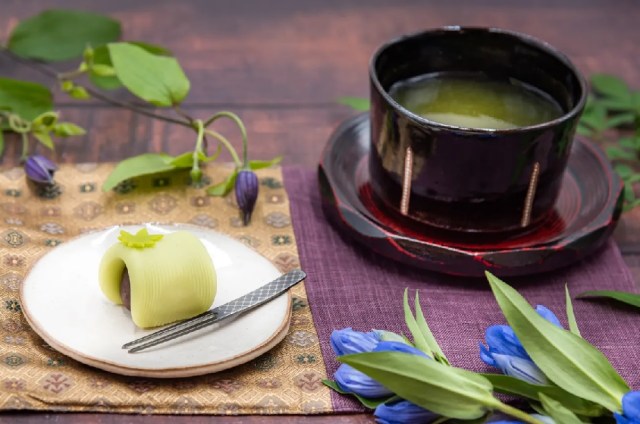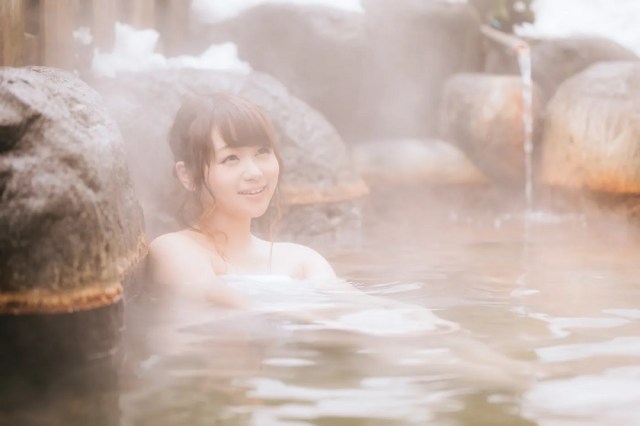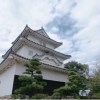
It may not be the only reason, but part of the plan is that green tea and wagashi will help keep you safe during your stay.
When you check into a Japanese inn, there are two things you can pretty much always count on to be waiting for you in your room: green tea and wagashi, as traditional Japanese sweets are called. Given how much Japan values unobtrusive hospitality and tranquil relaxation, it’s no surprise that refreshments are provided, right?
However, it turns out that sometimes there’s another reason Japanese inns provide snacks and tea, and that’s as a safety precaution. And no, the hotel’s worry isn’t that extra-hungry guests will go into a rampage without a tribute offering of sweet bean cakes, but that it might be dangerous for you to go into the bath without first partaking of the tea and wagashi.
Many Japanese inns have onsen (hot spring) baths, and even those that don’t have a supply of naturally geothermally heated water frequently have spacious bathing facilities, often with outdoor sections, landscaped gardens, or panoramic views. A nice, long soak is often the highlight of a guest’s stay, but while a dip can have rejuvenating effects, the heat can take a toll on your body if you stay in too long.
Those risks increase if you’re partially dehydrated or your blood sugar level is dipping before you get in the bath, and can sometimes lead to collapsing or fainting. That, according to a hotel industry acquaintance of Japanese Twitter user @bu_budog, is why onsen inns have tea and sweets in your room when you check in, so that you’ll get an influx of fluids and sugar before you hop in the bath.
温泉で最初に出てくるお菓子とお茶は「血糖値低下したまま温泉に入って倒れる」「水分不足で温泉に入って倒れる」人が古来からいたのでそれを防止するための措置だから「宿についたらお風呂の前にお菓子食べてお茶飲んでね!」と元ホテルマンに言われた朝でした!みんなお菓子食べてお茶飲んでね!
— 愚かなbubudog (@bu_budog) December 7, 2021
@bu_budog isn’t the only person to put forth this explanation, either. Public broadcaster NHK’s Chiko-chan ni Shikarareru variety program has also discussed the importance of pre-bath green tea and wagashi, as has hot spring travel portal Onsen Paradise Kagoshima.
▼ Though caffeine is a diuretic and in excess can contribute to dehydration, those effects don’t occur on a significant scale with a single cup of green tea, making it still a net-positive in terms of hydration.
Of course, this isn’t the only reason Japanese inns put out tea and sweets. They’ve become an expected part of the travel experience, so much so that some properties don’t even really think about their bath safety benefits, and often the wagashi that’s provided is a locally made specialty, which the inn also just so happens to sell souvenir boxes of so you can take some home to your friends if you enjoyed your free sample. Still, to some hoteliers those snacks aren’t just there to satisfy your taste buds but to protect you too, and if you’re looking for justification for eating your wagashi as soon as you get into the room, now you’ve got it.
Sources: Twitter/@bu_budog via Jin, Chiko-chan ni Shikarareru, Onsen Paradise Kagoshima, Healthline
Top image: Pakutaso
Insert images: Pakutaso, Wikipedia/FlickrLickr
● Want to hear about SoraNews24’s latest articles as soon as they’re published? Follow us on Facebook and Twitter!
Follow Casey on Twitter for more compelling reasons to eat wagashi.



 The 10 best hotel hot springs in Japan, as chosen by Japanese travelers
The 10 best hotel hot springs in Japan, as chosen by Japanese travelers Japan’s top five retro hot springs for a time trip back to the onsen past, as chosen by travelers
Japan’s top five retro hot springs for a time trip back to the onsen past, as chosen by travelers Freezing temperatures in Japan turn inn’s hot spring water to ice
Freezing temperatures in Japan turn inn’s hot spring water to ice The pros and cons of working from a Japanese hot spring inn
The pros and cons of working from a Japanese hot spring inn Beautiful new Tokyo hotel gives you the best of both worlds with hot spring bath in the big city
Beautiful new Tokyo hotel gives you the best of both worlds with hot spring bath in the big city Tokyo Skytree turns pink for the cherry blossom season
Tokyo Skytree turns pink for the cherry blossom season Highest Starbucks in Japan set to open this spring in the Tokyo sky
Highest Starbucks in Japan set to open this spring in the Tokyo sky The 10 most annoying things foreign tourists do on Japanese trains, according to locals
The 10 most annoying things foreign tourists do on Japanese trains, according to locals Japanese zoo’s monkey bonds with Ikea stuffed orangutang following abandonment by mother[Video]
Japanese zoo’s monkey bonds with Ikea stuffed orangutang following abandonment by mother[Video] Saitama is home to the best strawberries in Japan that you’ve probably never even heard of
Saitama is home to the best strawberries in Japan that you’ve probably never even heard of These are Tokyo train lines people most want to live along【Survey】
These are Tokyo train lines people most want to live along【Survey】 One of Japan’s oldest castles now lets travelers spend night on the grounds, drink in its keep
One of Japan’s oldest castles now lets travelers spend night on the grounds, drink in its keep Tokyo train little luxury showdown – Green Car vs. Kaiji, which is more comfortable?
Tokyo train little luxury showdown – Green Car vs. Kaiji, which is more comfortable? Japanese potato chip Rubik’s Cubes coming soon
Japanese potato chip Rubik’s Cubes coming soon Believe it! Naruto live-action stage play returns, shows off huge new cast and costumes【Photos】
Believe it! Naruto live-action stage play returns, shows off huge new cast and costumes【Photos】 Starbucks Japan releases new sakura goods and drinkware for cherry blossom season 2026
Starbucks Japan releases new sakura goods and drinkware for cherry blossom season 2026 Naruto and Converse team up for new line of shinobi sneakers[Photos]
Naruto and Converse team up for new line of shinobi sneakers[Photos] Is Sapporio’s Snow Festival awesome enough to be worth visiting even if you hate the snow? [Pics]
Is Sapporio’s Snow Festival awesome enough to be worth visiting even if you hate the snow? [Pics] Japan has trams that say “sorry” while they ride around town…but why?
Japan has trams that say “sorry” while they ride around town…but why? Sakura Totoro is here to get spring started early with adorable pouches and plushies
Sakura Totoro is here to get spring started early with adorable pouches and plushies Starbucks Japan unveils new sakura Frappuccino for cherry blossom season 2026
Starbucks Japan unveils new sakura Frappuccino for cherry blossom season 2026 Poop is in full bloom at the Unko Museums for cherry blossom season
Poop is in full bloom at the Unko Museums for cherry blossom season Now is the time to visit one of Tokyo’s best off-the-beaten-path plum blossom gardens
Now is the time to visit one of Tokyo’s best off-the-beaten-path plum blossom gardens Playing Switch 2 games with just one hand is possible thanks to Japanese peripheral maker
Playing Switch 2 games with just one hand is possible thanks to Japanese peripheral maker Japan’s newest Shinkansen has no seats…or passengers [Video]
Japan’s newest Shinkansen has no seats…or passengers [Video] Foreigners accounting for over 80 percent of off-course skiers needing rescue in Japan’s Hokkaido
Foreigners accounting for over 80 percent of off-course skiers needing rescue in Japan’s Hokkaido Super-salty pizza sends six kids to the hospital in Japan, linguistics blamed
Super-salty pizza sends six kids to the hospital in Japan, linguistics blamed Foreign tourists in Japan will get free Shinkansen tickets to promote regional tourism
Foreign tourists in Japan will get free Shinkansen tickets to promote regional tourism Take a trip to Japan’s Dododo Land, the most irritating place on Earth
Take a trip to Japan’s Dododo Land, the most irritating place on Earth Archfiend Hello Kitty appears as Sanrio launches new team-up with Yu-Gi-Oh【Pics】
Archfiend Hello Kitty appears as Sanrio launches new team-up with Yu-Gi-Oh【Pics】 Survey asks foreign tourists what bothered them in Japan, more than half gave same answer
Survey asks foreign tourists what bothered them in Japan, more than half gave same answer Japan’s human washing machines will go on sale to general public, demos to be held in Tokyo
Japan’s human washing machines will go on sale to general public, demos to be held in Tokyo Starbucks Japan releases new drinkware and goods for Valentine’s Day
Starbucks Japan releases new drinkware and goods for Valentine’s Day We deeply regret going into this tunnel on our walk in the mountains of Japan
We deeply regret going into this tunnel on our walk in the mountains of Japan Studio Ghibli releases Kodama forest spirits from Princess Mononoke to light up your home
Studio Ghibli releases Kodama forest spirits from Princess Mononoke to light up your home Major Japanese hotel chain says reservations via overseas booking sites may not be valid
Major Japanese hotel chain says reservations via overseas booking sites may not be valid Put sesame oil in your coffee? Japanese maker says it’s the best way to start your day【Taste test】
Put sesame oil in your coffee? Japanese maker says it’s the best way to start your day【Taste test】 No more using real katana for tourism activities, Japan’s National Police Agency says
No more using real katana for tourism activities, Japan’s National Police Agency says Japan’s top 10 open-air hot spring baths with cherry blossom views【Survey】
Japan’s top 10 open-air hot spring baths with cherry blossom views【Survey】 Low-cost Japanese inn welcomes foreign guests with hot springs, sake tastings, cosplay backdrops
Low-cost Japanese inn welcomes foreign guests with hot springs, sake tastings, cosplay backdrops Japanese hot spring inn lets you spend night for under US$1 if you do something special in return
Japanese hot spring inn lets you spend night for under US$1 if you do something special in return Doll otaku’s plastic bedmate gets loving hospitality from beautiful Japanese hot spring inn
Doll otaku’s plastic bedmate gets loving hospitality from beautiful Japanese hot spring inn Five amazing snow-view open-air Japanese hot springs in Hokkaido [Photos]
Five amazing snow-view open-air Japanese hot springs in Hokkaido [Photos] “The best ryokan I’ve ever visited” – A photo tour of Akita Prefecture’s Miyakowasure inn
“The best ryokan I’ve ever visited” – A photo tour of Akita Prefecture’s Miyakowasure inn The top five best multiple-hot-spring hotels in all of Japan
The top five best multiple-hot-spring hotels in all of Japan Japanese hot spring will wrap your face in gold leaf for the ultimate luxury facial
Japanese hot spring will wrap your face in gold leaf for the ultimate luxury facial Japanese pot sticker restaurant chain also runs flat-rate hot spring inn, but is it worth staying at?
Japanese pot sticker restaurant chain also runs flat-rate hot spring inn, but is it worth staying at? The 10 best ryokan inns in Japan, as chosen by travelers
The 10 best ryokan inns in Japan, as chosen by travelers Survey reveals the most popular time to slip into a yukata at a traditional Japanese inn
Survey reveals the most popular time to slip into a yukata at a traditional Japanese inn Eight unforgettable hot springs, as recommended by Japan’s “Professor Bath”
Eight unforgettable hot springs, as recommended by Japan’s “Professor Bath” With sushi breakfasts and hot spring baths, this Tokyo hotel could really use a different name
With sushi breakfasts and hot spring baths, this Tokyo hotel could really use a different name Take the “Public” Out of Public Bathing and Make a Natural Hot Spring in the Comfort of Your Own Home
Take the “Public” Out of Public Bathing and Make a Natural Hot Spring in the Comfort of Your Own Home Ibaraki Prefecture promotes onsen hot springs with muscly man bathing in 4K【Videos】
Ibaraki Prefecture promotes onsen hot springs with muscly man bathing in 4K【Videos】 Bathe with Japan’s famous hot spring monkeys in the comfort of your home with these tub stickers
Bathe with Japan’s famous hot spring monkeys in the comfort of your home with these tub stickers The top 10 hot springs Japanese travelers want to visit this fall
The top 10 hot springs Japanese travelers want to visit this fall